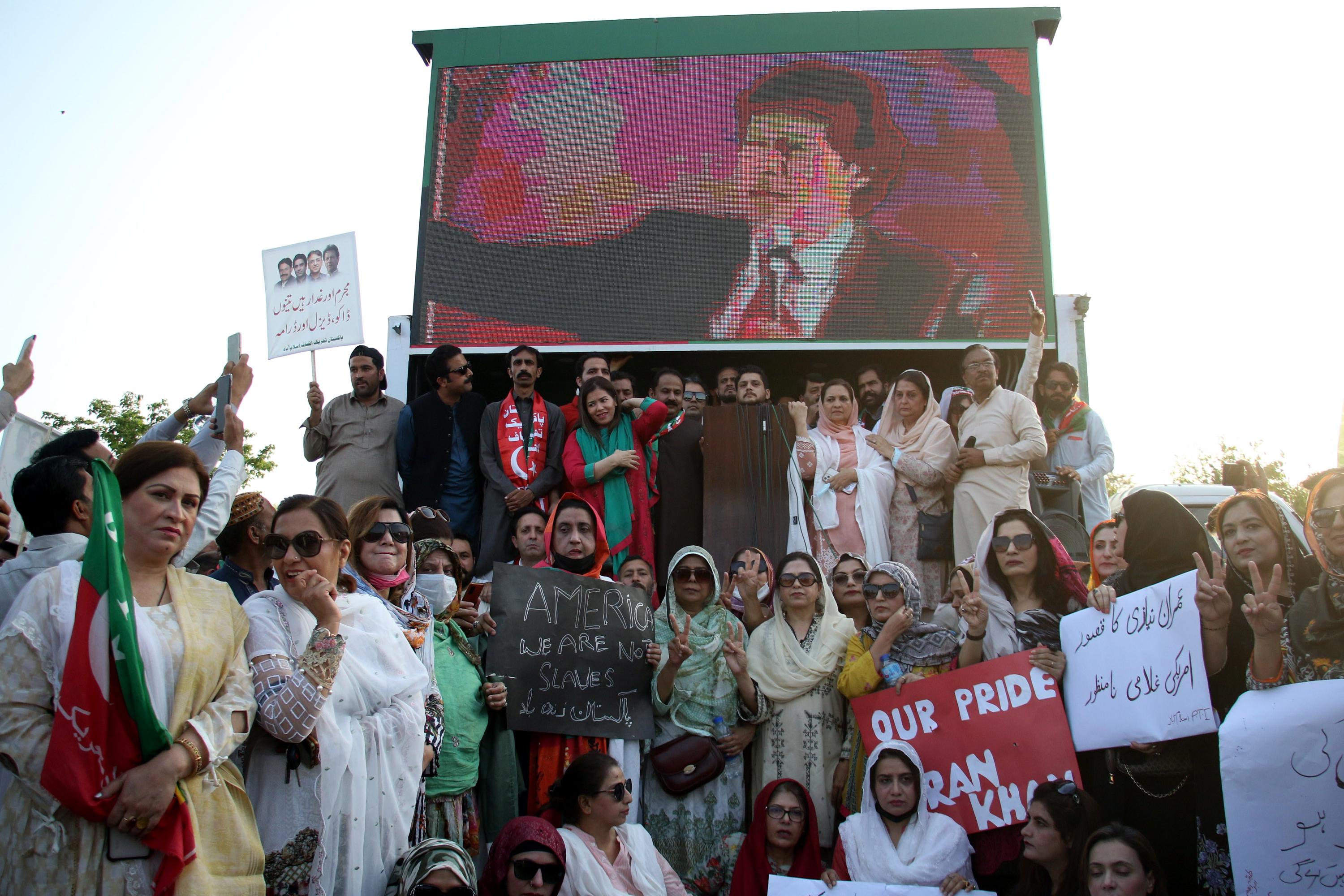Pakistan's political future at stake as Imran Khan's first innings as PM end
The country is already in election mode whatever the outcome of the Supreme Court’s deliberations.
Sign up now: Get ST's newsletters delivered to your inbox

Supporters of Pakistani Prime Minister Imran Khan during a rally in Islamabad on April 2, 2022.
PHOTO: EPA-EFE
Confronted by the prospect of losing a vote of confidence, Prime Minister Imran Khan dissolved Pakistan's Parliament on Sunday and called for early elections. The opposition has denounced this as unconstitutional and has filed a petition in the Supreme Court.
Separately, Chief Justice Umar Bandial has, on his own accord, taken notice of the political developments that have unfolded. The legitimacy of the government's actions will be deliberated upon in the Supreme Court in the coming days. Regardless of the judgment, it is clear Mr Khan's first innings as prime minister have come to an end.
Mr Khan's party, the Pakistan Tehreek-e-Insaf (PTI), came to power in 2018, promising to build a Naya Pakistan (New Pakistan). However, its inability to deal with rising debt and soaring inflation has led to disillusionment. He also lost the support of the military, which has been extremely influential in the political domain.
The rift with the military was reflected in a public disagreement over the appointment of the chief of the Inter-Services Intelligence spy agency in 2021. Mr Khan's call for an "azaad" (independent) foreign policy and rejection of, in his words, Pakistan's humiliating relations with the US, further estranged his relations with the military.
The latter has been keen to balance Pakistan's relations with China and the United States. Within this context, an opposition coalition consisting of the Pakistan Muslim League (Nawaz)(PML-N), Pakistan Peoples Party (PPP), Jamiat Ulema-e-Islam (Fazl) (JUI-F) and the Muttahida Qaumi Movement (Pakistan) (MQM-P) claims to have acquired a majority in Parliament.
Mobilising the base
Pakistan will witness intense political contestation in the coming months. If Mr Khan's gambit is deemed to have not infringed upon the Constitution, elections will take place by July this year. Even if the Supreme Court rules that the opposition must be allowed to hold the no-confidence vote, elections will have to take place by August next year. In fact, Pakistan is already in election mode. Over the past two months, various political parties have been mobilising their political base through rallies, protests, press conferences and the use of social media.
Mr Khan has devoted much of the past week to shoring up his support base. While the PTI has lost the majority in Parliament, it retains a strong and loyal base. Indeed, in the midst of complex political manoeuvrings, PTI emerged as the big winner in the local body elections in Khyber Pakhtunkhwa a week ago. Tellingly, it performed well against the JUI-F, which claims its strongest support in this province.
Mr Khan's message of fighting corruption and political dynasties, together with his appeal to religious symbolism, have won him support among the middle class and younger Pakistanis. In his public addresses over the past week, he has reiterated these issues. He has also presented himself as a lone figure fighting for the pride and integrity of Pakistan against foreign powers and their local conspirators.
While the PML-N, PPP and JUI-F are looking to the judiciary to reinstate the Parliament, they are nonetheless braced for an early election. After all, there is little that binds these parties together apart from their opposition to the PTI.
While the PML-N and PPP are rivals for power at the centre, the PPP and MQM-P have fought bitterly for influence in Karachi. Each member of this coalition is aware that even if they were to form the next government by defeating Mr Khan in a no-confidence vote, the alliance is likely to splinter before the next constitutionally determined election. Thus, they are also gearing up to fight their separate battles.
Looking ahead, it is important to keep an eye on the role of the military and the Supreme Court and consider the impact of recent political developments upon democratic processes.
No easy allies for the military
The upcoming election battle will be particularly interesting as the military does not have any easy allies this time round. The PML-N and PPP have complicated relations with the military. While they have received patronage from the military, they also blame the army for destabilising their governments.
In the past few months, the military has signalled its intention to remain neutral. With the Chief of the Army Staff up for retirement this year, it remains to be seen how detached it will stay in the formation of the new government.
On its part, the Supreme Court has again been thrust into a position where it will determine Pakistan's political future. The judiciary has made fundamental interventions in the political space before. These interventions range from ruling General Pervez Musharraf's actions as president to be unconstitutional to removing Mr Nawaz Sharif as prime minister. There have long been concerns that its authority to take suo moto notice over parliamentary affairs and interventions could impede the development of democratic structures.
Finally, it is also worth considering the implications of the dissolution of Parliament itself. The government has invoked Article 5, which states that loyalty to the state is the duty of every citizen. In doing so, it essentially implied that the opposition members who filed the no-confidence motion have conspired with a foreign power to act against Pakistan. Apart from being a serious allegation, this also questions the legitimacy of parliamentary processes.
In the coming days, Pakistan will witness a host of political negotiations, contestations and manoeuvrings. These will influence the future of democratic structures in Pakistan and reveal the political direction in which the country will head.
- Associate Professor Iqbal Singh Sevea is Director of the Institute of South Asian Studies, National University of Singapore.


